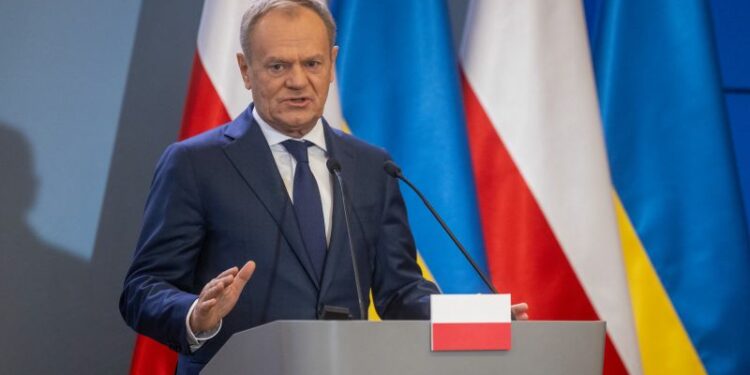Polish Prime Minister Donald Tusk has warned that Europe is in a “pre-war era” but still has a “long way to go” before its ready to confront the threat posed by Russia.
“War is no longer a concept from the past. It is real, and it started over two years ago. The most worrying thing at the moment is that literally any scenario is possible. We haven’t seen a situation like this since 1945,” Tusk said in an interview with German newspaper Die Welt published Friday.
“I know it sounds devastating, especially for the younger generation, but we have to get used to the fact that a new era has begun: the pre-war era. I’m not exaggerating; it’s becoming clearer every day.”
Since Russia launched its full-scale invasion of Ukraine in February 2022, European leaders and military officials have grown increasingly concerned that the conflict could spill over to other countries on its border. Russian President Vladimir Putin has repeatedly denied that Russia intends to attack NATO countries.
Russia’s war upended the post-Cold War geopolitical order, forcing Europe to take seriously its own defense after decades of dwindling military budgets and prompting countries on its border to take more drastic measures.
Sweden and Finland recently joined NATO – something that until two years ago would have been unthinkable for the two famously neutral Scandinavian countries. In the Baltics, Estonia and Lithuania have bolstered their defense budgets far above NATO’s minimum commitment of 2% of GDP. And Moldova, which borders Ukraine and has long been vulnerable to Russian meddling, is on an accelerated path to the European Union.
Meanwhile, the triumvirate of France, Germany and Poland – the so-called “Weimar Triangle” – has been spearheading the continent’s efforts to rearm and guard itself against further Russian aggression.
Odd Andersen/AFP/Getty Images
German Chancellor Olaf Scholz, Polish Prime Minister Donald Tusk and French President Emmanuel Macron in Berlin, Germany, March 15, 2024.
Tusk returned to power after last year’s election and has since been trying to haul Poland back into the European mainstream after nearly a decade of authoritarian rule under the populist Law and Justice Party.
Poland, sandwiched between Germany and Russia, has long been aware of the importance of strong defense. This year, Poland’s military budget was more than 4% of its GDP – double NATO’s guideline. It has also welcomed millions of Ukrainians who have fled Russia’s invasion.
Last weekend, Poland said a Russian cruise missile aimed at Ukraine had entered its airspace – a repeat occurrence during more than two years of war – and demanded an explanation from Moscow.
Despite Europe’s efforts to bolster its defense, Tusk said the continent still “has a long way to go.” He said it must be “independent and self-sufficient in defense” while maintaining a strong alliance in the US.
While US President Joe Biden has remained steadfast in his support for Ukraine, former President Donald Trump said last month that, if reelected in November, he would encourage Russia to do “whatever the hell they want” to any NATO member that doesn’t meet spending guidelines on defense.
“Our job is to nurture transatlantic relations, regardless of who the US president is,” Tusk said.
Tusk also warned that Russian President Vladimir Putin could use the terrorist attack at Crocus City Hall in Moscow as a pretext to escalate the war in Ukraine.
“We know from history that Putin uses such tragedies for his own purposes,” he said, recalling events in 2002 when Chechen gunmen took 800 hostages in Moscow’s Dubrovka Theatre and in 2004 when Chechen rebels took 1,200 children and adults hostage at a school in Beslan, southern Russia.
“Putin has already begun blaming Ukraine for the preparation of this attack, although he has not provided any evidence. Obviously, he feels the need to justify the increasingly violent attacks on civilian sites in Ukraine,” Tusk said.
Source link : https://amp.cnn.com/cnn/2024/03/29/europe/poland-tusk-europe-pre-war-russia-ukraine-intl
Author :
Publish date : 2024-03-29 07:00:00
Copyright for syndicated content belongs to the linked Source.


